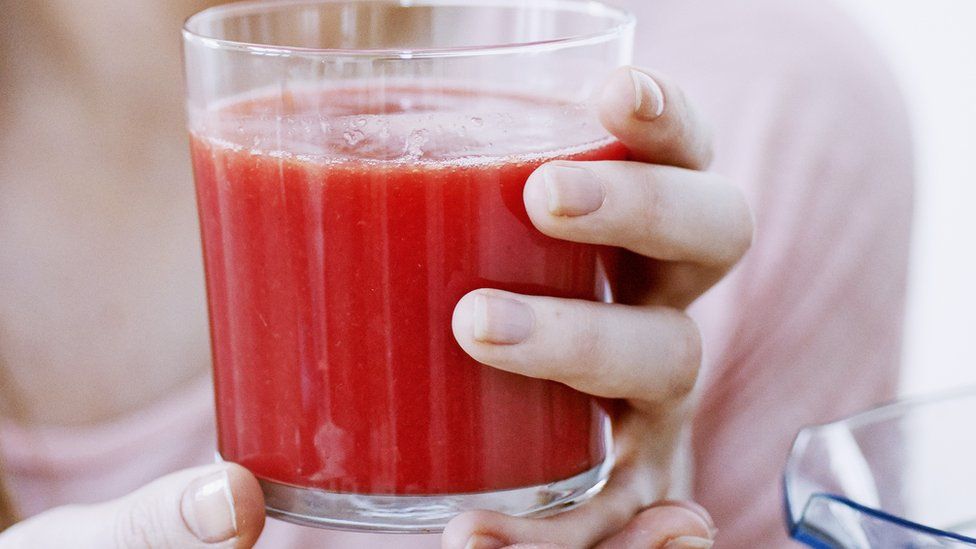Sugar in fruit drinks for children 'unacceptably high'
- Published
- comments

The amount of sugar in fruit juices, juice drinks and smoothies targeted at children is "unacceptably high", researchers and campaigners say.
They found an average of five teaspoons of sugar per 150ml serving in the 24 smoothies they surveyed - close to the daily limit for a young child.
In the journal BMJ Open, they argue such drinks should no longer count as one of the UK government's five-a-day.
But manufacturers say juices can make it easier to reach this target.
'Free sugar'
Current NHS guidelines state a 150ml serving of fruit juice or a 150ml glass of smoothie can count as one of the five fruit and vegetables people are encouraged to eat each day.
At the same time, parents are advised that children between four and six years of age should consume no more than 19g (about five teaspoons) of sugar a day, while children between seven and 10 years old should have a maximum of 24g (six teaspoons).
But researchers from the University of Liverpool, together with members of the campaign group Action on Sugar, say the way drinks are currently sold can make this very difficult to stick to.
They looked at a range of fruit juices, juice drinks and smoothies sold at seven UK supermarkets between July and August 2014, focusing on drinks they felt were targeted at children - for example, those on the children's section of a shop's website or cartons that would generally fit in children's lunchboxes.
Of the 203 fruit juices, fruit drinks and smoothies they found, they say the free sugar content ranged between zero and 16g per 100ml.
Among the 158 fruit drinks analysed, the average sugar content stood at 5.6g/100ml (just over one teaspoon).
Among the 21 fruit juices, they found an average of 10.7g/100ml (just over two teaspoons).
And in 24 smoothies there was an average of 13g/100ml (just over three teaspoons).
The term "free sugar" refers to sugar naturally occurring in honey, syrups and fruit juices, or added by a manufacturer, rather than that found in whole fruit, vegetables and milk.
NHS experts say these free sugars are broken down by the body in a different way and can be harmful to health.
Dr Louis Levy, at Public Health England, added: "We know that juice and smoothies are high in sugar, which is why PHE recommends limiting them to a combined total of 150ml glass per day, to be drunk with a meal to protect your teeth.
"However they also provide some fibre, vitamins and minerals so count towards one of your five a day.
"The other recommendations for individuals in this paper support current government advice."
Meanwhile, Gavin Partington, of the British Soft Drinks Association, said:"Only last week Public Health England confirmed that 150ml of fruit juice or fruit juice smoothies can contribute to the five-a-day target.
"Very few people reach their five-a-day target, and given the positive contribution it has to the diet, it is counterintuitive to suggest that 100% pure juice should not contribute to it."
The NHS Choices website on the other hand, has specific advice about juice drinks, warning people to "watch out for drinks that say juice drink on the pack, as they are unlikely to count towards five-a-day and can be high in sugar".
- Published17 February 2016
- Published17 July 2015
- Published17 March 2016